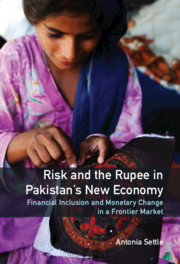 Risk and the Rupee in Pakistan's New Economy
Risk and the Rupee in Pakistan's New Economy Published online by Cambridge University Press: 31 March 2020
The analysis developed over the preceding six chapters offers a reading of radical monetary change in the wake of the liberalisation of money and markets. In Pakistan's new economy, the rupee and the everyday prices that express its usefulness are characterised by instability. Certainly, this is not the extreme instability of hyperinflation. But it is an instability substantive enough to prompt a series of hedging practices, which effectively contest the primacy of the rupee by dispersing money functions across an array of alternative assets. By using nonstate money instruments for money functions, households seek to protect themselves from new rupee-related risk in an economic environment that is characterised by uncertainty.
This story of the loss of trust in money amidst the instability and uncertainty generated by open markets finds a natural home within Post-Keynesian thinking. After all, these issues express key Post-Keynesian themes, such as the contingency of money on social trust and the fundamental uncertainty that drives the imperative of stabilisation policies. Yet this reading of monetary change in Pakistan's new economy runs counter to certain key Post-Keynesian contributions to economic thinking. Specifically, the theoretical lineage of Post-Keynesian monetary thinking sets out a dichotomy between money and commodities that does not easily account for the kind of monetary change that has been observed in Pakistan.
At issue is the state theory of money that underlies much thinking about money. From a state theory perspective, money cannot be an ordinary market commodity because it is a social construction that is indelibly linked to the state. Be it the ‘bank money’ that is issued by the state-supervised banking system or the notes, coins and central bank balances issued directly by the state, conventional thinking about money posits money by definition as a ‘creature of the state’ (Lerner, 1947). From a state theory perspective, the uniqueness of money amidst other assets lies herein: its defining characteristics are ascribed to the authority of the state under which it is issued.
To the contrary, this study has shown how the cornerstone role of the rupee as safe and stable can be compromised, and how certain uses of some commodities (primarily but not exclusively grain and cattle), can in fact be conceived of as commodity money.
To save this book to your Kindle, first ensure no-reply@cambridge.org is added to your Approved Personal Document E-mail List under your Personal Document Settings on the Manage Your Content and Devices page of your Amazon account. Then enter the ‘name’ part of your Kindle email address below. Find out more about saving to your Kindle.
Note you can select to save to either the @free.kindle.com or @kindle.com variations. ‘@free.kindle.com’ emails are free but can only be saved to your device when it is connected to wi-fi. ‘@kindle.com’ emails can be delivered even when you are not connected to wi-fi, but note that service fees apply.
Find out more about the Kindle Personal Document Service.
To save content items to your account, please confirm that you agree to abide by our usage policies. If this is the first time you use this feature, you will be asked to authorise Cambridge Core to connect with your account. Find out more about saving content to Dropbox.
To save content items to your account, please confirm that you agree to abide by our usage policies. If this is the first time you use this feature, you will be asked to authorise Cambridge Core to connect with your account. Find out more about saving content to Google Drive.